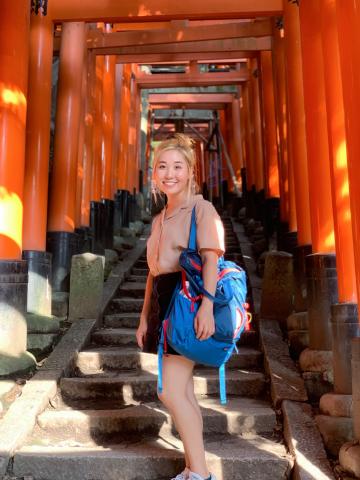Sustainability Journeys: Meet Zoë Tribley

Please share a bit about yourself, what you do for work or study, and when you became interested in sustainability.
My name’s Zoë, she/her/hers, I’m currently an FSU graduate student in East Asian Languages and Cultures focusing on Chinese language and literature. I am a teaching assistant teaching Chinese 2. I’ve always been interested in sustainability, but I think when it really became a committed practice was in my junior year of high school around the time of taking AP Earth, Space, and Science.
What adjustments have you made to your sustainable lifestyle since COVID-19 interrupted much of our daily lives?
I’ve started a bokashi food compost, it was really cheap to buy and the process from food waste to soil nutrients is so easy. I eat out at an incredibly reduced rate due to social distancing so my accumulation of plastic takeout items has become next to none. Instead of throwing away over two trash bags of old tee shirts, I’m sewing a t-shirt quilt to reuse the materials and make something meaningful. Now that school is online and I teach online through Zoom, I’m only driving about once or twice a week, reducing my carbon footprint and use of fossil fuels. And since being in quarantine forced me to look at every material item in my immediate space, I really ramped up my downsizing by donating clothes I haven’t worn in the past three months, donating books I either hated but still kept or knew I wasn’t going to read but still kept, and using every lotion, Chapstick, and makeup item to its fullest extent before cleaning and recycling the container.
How has your interest in sustainability shaped your career/studies?
I want to eventually work for the National Resources Defense Council, especially either at the Beijing Branch, or at any of their branches but working specifically in international communications between America and China. As the world's two biggest polluters, both America and China need to be doing more to help the environment, stop unfettered fossil fuel use and improper disposal of waste, and paying reparations to smaller countries its pollution and waste has affected.
Any tips or tricks for people who are just beginning their sustainability journeys?
Here are some ideas!
- If you are able, buy what’s going to last you a long time, even if it’s more expensive up front. It’s cheaper and more reliable in the long run.
- Before throwing away a material item, quickly research first on how to recycle it. Many animal shelters will take old towels, bed sheets, pillows, blankets, etc, so instead of just thinking to throw it away, think about who might benefit from it having a second life.
- There’s so many reusable, machine washable cloth pads for makeup removal, face washing, all of that. Single use cotton rounds, in fact most single use anything, doesn’t need to exist.
- If you can carry the one or two items you just bought from Publix, skip the plastic bag.
- Before you buy anything, question if you already have one, how often do you use the one you already have, how often will you use the new one? When you own a lot of stuff do you really own it or does it own you?
- Sewing in the corners of your old, stretched out socks stops them from falling down your ankles and adds more wear and wash cycles to them.
- Vote for people who actually care about the environment and take climate change seriously.
- Support local businesses when you can.
- All cardboard and paper Amazon packaging is recyclable and then the blue, plastic Amazon packaging can be recycled at your local Publix in the green plastic recycle bin.
Sustainable Campus would like to thank Zoë for sharing her Sustainability Journey with us. Have an interest or career in sustainability? We'd love to hear from you! Email our Communications Coordinator, Michelle Presley at mpresley2@fsu.edu with the subject line: Sustainability Journeys.
